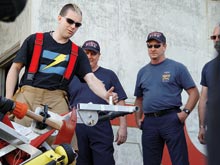Hackophilia 2.0
“Everything is work, and nothing is.” That’s what our group’s main research engineer said when I asked him, shortly after I crash-landed at MIT, what he did to amuse himself outside the lab. I knew immediately what the poor, twisted fiend meant. MIT people approach both work and play with the fanaticism of the newly converted, and the boundaries between the two are apt to blur. In short order they blurred for me as well. As graduation approached with all the impending force of a supercavitating torpedo fired through a sea of molasses, one question remained: how to follow a riveting act like the Institute with a similar onslaught of pure, unadorned hackophilia.

As I wrapped up my dissertation, I found myself shooting the pilot for a new TV show called Prototype This! Call me a lying swine if you will, but the show, which is all about techno-obsession, doesn’t feel radically different to me from graduate school at MIT. The conceit is simple: a new, high-tech invention every episode. Engineering, product design, fabrication, and gratuitous use of microcontrollers, with a deadline that’ll make your skull bleed. My cohosts and I jokingly call it Complicate This! But I think of our motto as the words that hackers famously inserted into the Lobby 7 inscription: “Entertainment and hacking.”
First, the similarities. Your “advisor” just becomes a “producer,” and the electroshock electrodes don’t even need the conductive gel changed. In academia, if it’s not published, it didn’t happen; in TV, if it wasn’t on camera, we might as well claim we were off racing Vincent Black Shadow motorcycles with Jesus and the Easter Bunny. Not only must the project be finished, but the process must be captured and explained to a wide audience of international science hooligans who aren’t necessarily cheering for the home team. Any veteran of significant Media Lab campaigns can be made to sweat and gibber profusely at the mere mention of “Hell Week,” the semiannual corporate circus maximus at which students’ projects must be pummeled into a condition worthy of demonstration in the merciless public arena. Prototype This! has weeks like that too–we call them “every week.”
Not that the lab and the TV studio don’t have a few jarring differences. What’s the matter, can’t engineer with a camera in your face? Better get used to it. Prefer to test something extensively before it’s expected to work, and to sift through your results and publish the important parts later? Think again, mister on-screen talent. Enjoy naturally flowing conversations? Enjoy naturally flowing conversations? Enjoy naturally flowing conversations? On TV you say everything three times: for the close-up, the wide shot, and the reactions. And life on videodisc (tape now an anachronism) is slavery to the sun god. Always nocturnal, I was dismayed to discover that “work day” meant the 10 to 15 hours starting shortly after sunrise.
In all honesty, I wrestled for a long time over whether to take the job. Isn’t television an enormous flickering leech on our collective flesh? Every minute someone spends plunked down in front of the box is another minute that’s sucked away from art and invention. Did I really want the skills I’d been lucky enough to hone at MIT put to use making an entertaining diversion for the masses? What tipped the balance was the reaction to another show I’d done four years before: apparently, it had inspired more than one MIT undergrad’s application. So maybe hijacking the luminous feeding tube to spark that extra minute’s interest in science and engineering is a hack in itself. I signed up.
There are perks, to be sure. The entertainment head of the beast requires sating with excursions and illustrative sequences to break up the engineering action; we call it “lipsticking the pig.” So far, I’ve thrown pizza out of the Goodyear blimp, flown on a rescue drop mission with the U.S. Coast Guard, ridden a flying trapeze, trained with firefighters, and hacked a prototype mind-control headset to become the first person ever to truly bend a spoon just by thinking about it. It turns out that the pig can hold quite a bit of lipstick. Perhaps TV and MIT have more in common than we might think.
-Zoz Brooks, PhD ‘07, puts his expertise in electrical engineering and computer science on the line weekly as a cohost of the Discovery Channel’s Prototype This!
Keep Reading
Most Popular
Large language models can do jaw-dropping things. But nobody knows exactly why.
And that's a problem. Figuring it out is one of the biggest scientific puzzles of our time and a crucial step towards controlling more powerful future models.
The problem with plug-in hybrids? Their drivers.
Plug-in hybrids are often sold as a transition to EVs, but new data from Europe shows we’re still underestimating the emissions they produce.
Google DeepMind’s new generative model makes Super Mario–like games from scratch
Genie learns how to control games by watching hours and hours of video. It could help train next-gen robots too.
How scientists traced a mysterious covid case back to six toilets
When wastewater surveillance turns into a hunt for a single infected individual, the ethics get tricky.
Stay connected
Get the latest updates from
MIT Technology Review
Discover special offers, top stories, upcoming events, and more.